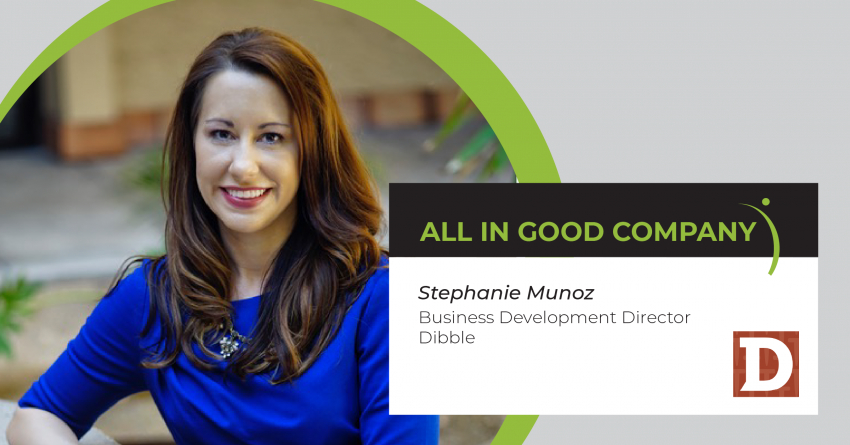Stephanie Munoz—Business Development Director
As a firm Principal/leader, what have you done to create a marketing mentality in your firm/office?
I’ve been with Dibble for 24 years, and my role and position of influence has grown throughout this time.I was originally hired as a Marketing Assistant, learning the industry from the ground up. The company culture placed great emphasis on the importance of marketing and business development, so I was fortunate to come into a company where the marketing mentality was strong. As the company grew, so did my career. I rose through the channels of Marketing Coordinator, Marketing Manager, and then to a hybrid role of Marketing and Business Development Manager.
We have evolved as a department, so we are better aligned to achieve our company’s strategic plans and growth goals. Our current structure is one of collaboration in which we have incorporated these targeted individuals in each of our business units that are tasked with specific initiatives. The marketing mentality of collaboration aligns us to share efforts in working towards a common vision. This has proven to be successful in growing existing business units, expanding service lines, and opening several offices in new geographic locations.
All of this could not have been achieved if we were not practicing the principles of a “living company.” Living companies promote a sense of community, collaboration at all levels, and focus on growth opportunities for their teams. Dibble values our people and our clients, and we continue to support a marketing mentality by delivering on our promises.
Is there someone who mentored you about marketing mentality?
The first individual that comes to mind is the person who introduced me to this industry. He hired me while in college and unofficially mentored me for many years thereafter. He believed in the importance of marketing and business development, and always ensured these philosophies were a part of our company. This concept was also seen in one of our company’s original values, which stated, “marketing and business development is a continuous process.” This meant that everything we do involves a marketing mentality. This concept was incorporated into all company meetings and events—including training sessions, discussions with clients, etc.
Externally, I wanted to learn from the best of the best and was mentored by a business development principal at a national firm.This mentor became by my guiding light and sounding board for many of my career highs and lows. From the beginning, she mentored me on what it would take to achieve my professional goals. We would work through tough scenarios I was experiencing and share in my successes. She would guide me with her stories, ways of practice, words of encouragement, and personal experiences from her own career.
How do you get firm leaders on board for your marketing initiatives?
I equate this to the belief that marketing is a team sport. This means that everyone has an active role in contributing to the company’s success.The best way to showcase this is through the art of storytelling. Articulating examples of successes both big and small goes a long way in helping others see how a particular initiative has played out.
I use storytelling to not only celebrate personal success, but more importantly to celebrate the success of others. If you believe in the idea that everyone contributes to the marketing mentality of the firm, show this by communicating stories of success.
How do you get non-marketing staff or technical staff involved in and excited about supporting marketing efforts?
First, you must provide training and mentorship. How can you ask someone to support marketing initiatives if they’ve not successfully been given the tools or training to do so? We emphasis and provide many different training opportunities that are both technical and non-technical in nature. Most recently, we invested in a multi-day workshop focusing on emotional intelligence training, which was facilitated by an external trainer. Dibble also provides many internal trainings on topics such as proposal process, business development panels, networking, proposal writing, client panels, interview training, etc.
At Dibble, involving non-marketing staff in marketing initiatives is often part of their career ladder. Through annual goal-setting, formal mentoring programs, or through succession planning, we can identify individuals who seek to grow their careers and thus become involved in marketing initiatives. There is no one-size-fits-all, as it’s customized based on the individual. By applying a specific approach, we can work side by side in supporting, coaching, and providing the tools for execution.
What are three tips you give your marketing coordinators to help them progress and evolve in their role?
- Find a mentor(s), like an industry icon or someone who excels in marketing, and partner up with them. Have them become your cheerleader and help you work through your goals. Use their expertise to help you navigate the bumps along your career path—both internally and externally.
- Be confident in your skillset. The evolution of marketing is very exciting, and instead of marketing being viewed as supplemental resource in our industry, we’re seeing it rise as a true profession. Continue your training, as our skills are never completely mastered and you can always improve.
- Get involved professionally in organizations. My best on-the-job learning has come from personal involvement in organizations as an active and engaged member. You get out what you put in, so volunteer for committee, chair, or board-level positions.
Are there any books you’ve read or other media that you would recommend regarding marketing mentality?
One book that has stuck out is called The Leadership Pipeline.The theory behind the book is focusing on growing leaders within your organization. It discusses in detail how you should seek to find your replacement so that they can assume your role and you can elevate to the next level. The more you invest in people, the more you can grow and do greater things while growing future leaders.
What are the biggest hurdles your team/office/firm faces related to marketing/BD?
The general challenge within marketing and business development is that it's easy to be consumed with what is right in front of you … daily, weekly, monthly deadlines! The hard part is finding the time to look up and outward toward the objectives set up in our long-range strategic plans. Keeping that longer-term vision in mind daily is often hard to do when you are bogged down with items at a task level.






